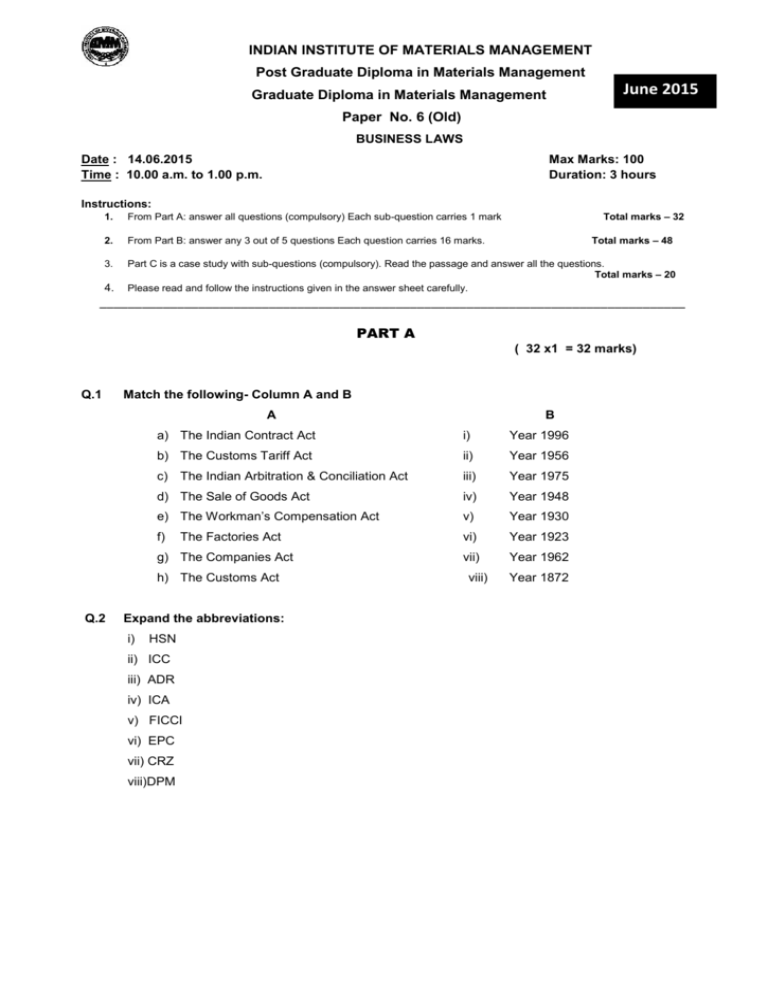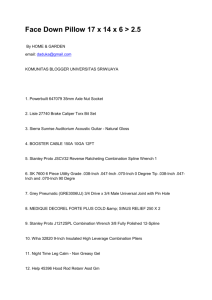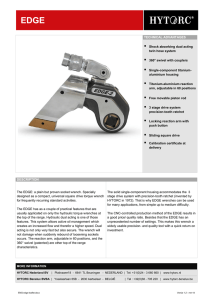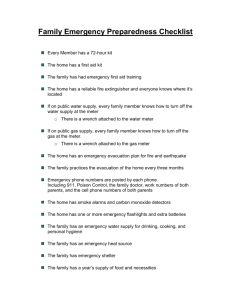BUSINESS LAWS (Paper 6b) - Indian Institute of Material Management
advertisement

INDIAN INSTITUTE OF MATERIALS MANAGEMENT Post Graduate Diploma in Materials Management June 2015 Graduate Diploma in Materials Management Paper No. 6 (Old) BUSINESS LAWS Date : 14.06.2015 Time : 10.00 a.m. to 1.00 p.m. Max Marks: 100 Duration: 3 hours Instructions: Total marks – 32 1. From Part A: answer all questions (compulsory) Each sub-question carries 1 mark 2. From Part B: answer any 3 out of 5 questions Each question carries 16 marks. 3. Part C is a case study with sub-questions (compulsory). Read the passage and answer all the questions. Total marks – 20 Please read and follow the instructions given in the answer sheet carefully. 4. Total marks – 48 ___________________________________________________________________________________ PART A ( 32 x1 = 32 marks) Q.1 Match the following- Column A and B A a) The Indian Contract Act i) Year 1996 b) The Customs Tariff Act ii) Year 1956 c) The Indian Arbitration & Conciliation Act iii) Year 1975 d) The Sale of Goods Act iv) Year 1948 e) The Workman’s Compensation Act v) Year 1930 f) vi) Year 1923 vii) Year 1962 The Factories Act g) The Companies Act h) The Customs Act Q.2 Expand the abbreviations: i) B HSN ii) ICC iii) ADR iv) ICA v) FICCI vi) EPC vii) CRZ viii)DPM viii) Year 1872 Q.3 State whether the following are true or falsea) A partnership firm is not a person in the eyes of law and therefore cannot be a party to a contract. b) A person is said to be of age of majority if he has completed 16 years of age. c) A valid contract should be preceded by an agreement. d) The term ‘Quasi Contract’ has been defined by the Contract Act. e) The Contract Act lays down the age of majority. f) Acceptance need not be given only in the prescribed mode. g) Proposal is the first step towards the formation of contract. h) When a person accepts a ‘General Offer’ it does not become a promise at once. Q.4 Fill in the blanksa) Every promise and every set of promises forming the ................. for each other is an agreement. b) The proposal is the ...... step towards the formation of contract. c) All the advertisements appearing in the news papers are invitation to offers, but only one exception is made and that is, advertisement of ....... are offers. d) An offer should not contain any term, the non-compliance of which amounts to .......... on the part of the offeree. e) Communication of proposal is ......... when it comes to the knowledge of offeree. f) Acceptance should be given only by the ......... to whom the offer is made. g) Acceptance should be absolute and ................ h) An agreement made by parties should ................ to the prescribed legal formalities. PART-B (Answer any three 3 x16 = 48 marks) Q.5 Distinguish between any two i) Sale and hire purchase ii) Law and Morality iii) International law and Municipal laws iv) Sales Tax and Inter State Sales Tax v) Shares and Debentures Q.6 Write short notes on any twoi) Capacity to contract ii) Implied Warranties iii) Performance of Contract of Sale iv) MODVAT v) Bonded Warehouses Q.7 a) What signifies the term ‘unpaid seller’ under the Sale of Goods Act. b) Explain Sale by description and sale by sample. Q.8 a) What are the elements of a valid contract? b) Explain the essentials of a valid contract. Q.9 a) Explain the term – Performance of Contract of Sale b) Explain Alternate Dispute Resolution. PART-C Case Study 20 marks Compulsory Q.10 Read the following case study relating to the famous case of HYDE Vs WRENCH. The brief of the case is: In this case Wrench was the owner of the farm land. Wrench made an offer to sell his land for 1000 pounds. Hyde, instead of accepting the offer made his own offer to buy the farm land for 900 pounds. Wrench declined to sell the farm land for 900 pounds. Again HYDE offered to pay 1000 pounds as demanded by Wrench. But the latter refused to sell his farm land even for 1000 pounds Hyde tried to prevail upon Wrench, that as he had already agreed to pay the price originally demanded by Wrench, the farm land automatically became his property and as such there was no logic on the part of Wrench in denying him the land. He tried to prevail upon him through third parties but did not succeed. He even threatened him to file a suit and claim possession besides claiming of damages and other costs. When all his attempts of persuasion and threats failed, he decided to file a suit. In a suit filed against Wrench, Hyde contended that although he was ready and willing to pay 1000 pounds as demanded by Wrench, the latter was unwilling to sell the land for 1000 pounds in compliance with his offer. The court rejected the plea and pointed out that the original offer made by Wrench had automatically lapsed on Hyde. WRENCH won the case. Analyse the above case that led to the Honourable Judges deciding the case in favour of Wrench (under the Indian Contract Act). Each valid reason will get 4 marks, with a total of 20 marks) *********





